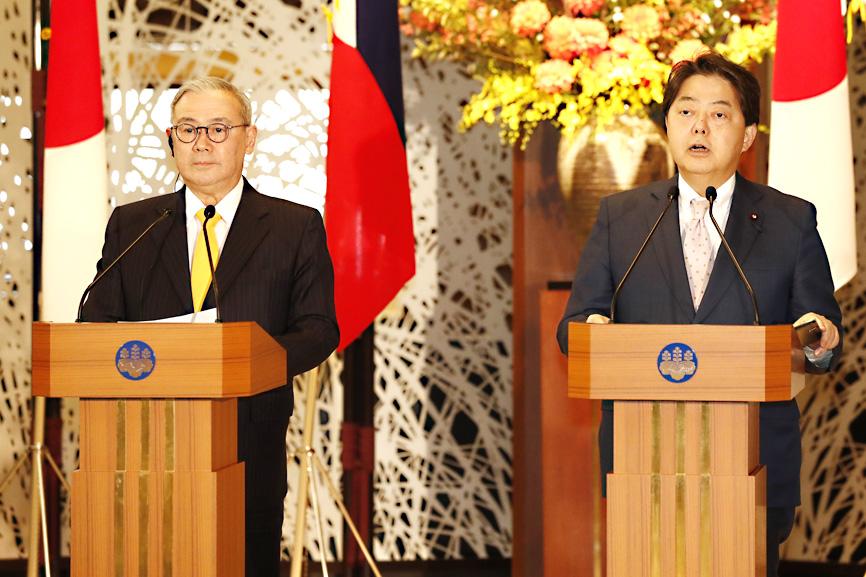Japan and the Philippines yesterday agreed to start talks toward a possible defense agreement that would allow closer cooperation between their militaries amid regional tensions with China and Russia’s invasion of Ukraine.
Japanese Minister of Foreign Affairs Yoshimasa Hayashi and Japanese Minister of Defense Nobuo Kishi, along with Philippine Secretary of Foreign Affairs Teodoro Locsin Jr and Philippine Secretary of Defense Delfin Lorenzana, in their first so-called “2+2” security meeting agreed to begin formal discussions about a possible reciprocal access agreement — a pact that would allow their troops to visit each other’s countries for training, and to exchange defense equipment to increase interoperability and cooperation.
Japan and the Philippines, both US allies, have in the past few years stepped up joint exercises and defense cooperation. In 2020, Tokyo and Manila agreed on the export of Japanese air radar systems to the Philippine military.

Photo: EPA-EFE
The four ministers strongly opposed “actions that may increase tensions” in the East and South China seas, and affirmed their commitment to a rules-based approach to resolving competing claims under international law.
They also said that Russia’s aggression in Ukraine affects Europe and Asia under an international order that does not accept any unilateral change to internationally recognized borders by force.
Although it was implied that China was their main concern, they carefully avoided identifying it by name.
“We agreed that it’s timely to look into the possibility of further expanding our defense cooperation and activities” and to explore ways to conduct capacity and capability building activity “to address issues of mutual concern,” Lorenzana told a joint news conference after the talks.
Kishi said the first “2+2” meeting marks “the beginning of the two countries’ efforts toward further deepening their security ties.”
Japan in January signed a defense cooperation pact with Australia, the first such agreement for Canberra other than with the US.
Japan in the past few years has significantly expanded security talks and joint drills with the US and other partners that share its concerns about China’s assertion of its territorial claims in the region, which is home some of the world’s busiest sea lanes.
Japan is especially concerned about Chinese military and coast guard activity in the East China Sea near the Japanese-controlled Diaoyutai Islands (釣魚台), known as the Senkaku Islands in Japan.
Taiwan, China, the Philippines, Vietnam, Malaysia and Brunei have been locked in an increasingly tense territorial standoff in the busy South China Sea waterway for decades.
Yesterday’s agreement came one day after Chinese President Xi Jinping (習近平) told outgoing Philippine President Rodrigo Duterte that Beijing and Manila have handled their South China Sea disputes properly, and that “regional security cannot be achieved by strengthening military alliances,” Xinhua said.

A magnitude 5.6 earthquake struck off the coast of Yilan County at 12:37pm today, with clear shaking felt across much of northern Taiwan. There were no immediate reports of damage. The epicenter of the quake was 16.9km east-southeast of Yilan County Hall offshore at a depth of 66.8km, Central Weather Administration (CWA) data showed. The maximum intensity registered at a 4 in Yilan County’s Nanao Township (南澳) on Taiwan’s seven-tier scale. Other parts of Yilan, as well as certain areas of Hualien County, Taipei, New Taipei City, Taoyuan, Hsinchu County, Taichung and Miaoli County, recorded intensities of 3. Residents of Yilan County and Taipei received

Taiwan has secured another breakthrough in fruit exports, with jujubes, dragon fruit and lychees approved for shipment to the EU, the Ministry of Agriculture said yesterday. The Animal and Plant Health Inspection Agency on Thursday received formal notification of the approval from the EU, the ministry said, adding that the decision was expected to expand Taiwanese fruit producers’ access to high-end European markets. Taiwan exported 126 tonnes of lychees last year, valued at US$1.48 million, with Japan accounting for 102 tonnes. Other export destinations included New Zealand, Hong Kong, the US and Australia, ministry data showed. Jujube exports totaled 103 tonnes, valued at

TRUST: The KMT said it respected the US’ timing and considerations, and hoped it would continue to honor its commitments to helping Taiwan bolster its defenses and deterrence US President Donald Trump is delaying a multibillion-dollar arms sale to Taiwan to ensure his visit to Beijing is successful, a New York Times report said. The weapons sales package has stalled in the US Department of State, the report said, citing US officials it did not identify. The White House has told agencies not to push forward ahead of Trump’s meeting with Chinese President Xi Jinping (習近平), it said. The two last month held a phone call to discuss trade and geopolitical flashpoints ahead of the summit. Xi raised the Taiwan issue and urged the US to handle arms sales to

BIG SPENDERS: Foreign investors bought the most Taiwan equities since 2005, signaling confidence that an AI boom would continue to benefit chipmakers Taiwan Semiconductor Manufacturing Co’s (TSMC, 台積電) market capitalization swelled to US$2 trillion for the first time following a 4.25 percent rally in its American depositary receipts (ADR) overnight, putting the world’s biggest contract chipmaker sixth on the list of the world’s biggest companies by market capitalization, just behind Amazon.com Inc. The site CompaniesMarketcap.com ranked TSMC ahead of Saudi Aramco and Meta Platforms Inc. The Taiwanese company’s ADRs on Tuesday surged to US$385.75 on the New York Stock Exchange, as strong demand for artificial intelligence (AI) applications led to chip supply constraints and boost revenue growth to record-breaking levels. Each TSMC ADR represents